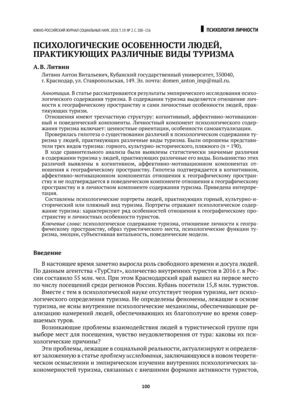Abstract
The results of an empirical research of the psychological content of tourism are presented in the paper. It was necessary to single out an individual’s attitude to geographical space, as well as personal characteristics of people who practice tourism, within the framework of the content of tourism. The attitude includes three components: cognitive, affective-motivational and behavioral. The personal component of the psychological content of tourism includes value orientations and specific characteristics of self-actualization. It was assumed that there were distinctions in the psychological content of tourism among people practicing different types of tourism. To verify the hypothesis, representatives of three types of tourism (mountainous, cultural-historical, and beach (n = 190)) were polled. In the course of the comparative analysis, statistically significant differences in the content of tourism among people practicing various types of tourism were revealed. Most of these differences occur in the cognitive and the affective-motivational components of the attitude to geographical space. The hypothesis is confirmed in the cognitive and the affective-motivational components of the attitude to geographical space, and is not confirmed in the behavioral component of the attitude to geographical space and in the personal component of the content of tourism. The interpretation of the results is represented in the paper. Psychological portraits of people practicing mountain, cultural, historical or beach type of tourism were made up. The portraits reflect the psychological content of tourism; namely, they describe a number of features of the attitude to geographical space, and personal characteristics of tourists.
Keywords
References
Aleksandrova, L. A. (2014). Sub”yektivnaya vital’nost’ kak predmet issledovaniya [Subjective Vitality as a Research Object]. Psikhologiya. Zhurnal Vysshey shkoly ekonomiki [Psychology. Journal of Higher School of Economics], 1, 133–163.
Angyal, A. (1941). Foundations for a Science of Personality. New York: The Commonwealth Fund.
Berezina, T. N. (2012). Mnogomernaya psikhika. Vnutrenniy mir lichnosti [Multidimensional psyche. The Inner World of the Individual]. Moskva: PER SE.
Bianchi, C. (2015). Solo Holiday Travellers: Motivators and Drivers of Satisfaction and Dissatisfaction. International Journal of Tourism Research, 4, 17–32. doi: 10.1002/jtr.2049
Chuandong, H. (2013). Tourism: An Explanation of Evolutionary Psychology. Tourism Tribune, 28 (9): 102–108.
Dodonov, B. I. (1978). Emotsiya kak tsennost’ [Emotion as a value]. Moskva: Politizdat.
Dyomin, A. N., Pivkin, D. Yu. (2014). Razrabotka oprosnika “Psikhologicheskaya struktura zanyatosti” [Development of the questionnaire “Psychological structure of employment”]. Psikhologiya. Ekonomika. Pravo [Psychology. Economy. Law], 4, 18–29.
El’konin, B. D. (1994). Vvedeniye v psikhologiyu razvitiya (v traditsii kul’turno-istoricheskoy teorii L. S. Vygotskogo) [Introduction into Psychology of Development (in the Tradition of Cultural and Historic Theory of L. S. Vygotsky)]. Moskva: Trivola.
Fernkhem, A., Kheyven P. (2001). Lichnost’ i sotsial’noye povedeniye [Personality and Social Behaviour] Sankt-Peterburg: Piter.
Filep, S. (2012). Positive Psychology and Tourism. Handbook of Tourism and Quality-of-Life Research, 2, 31–50. DOI: 10.1007/978–94–007–2288–0_3
Gold, Dzh. (1990). Psikhologiya i geografiya: osnovy povedencheskoy geografii [An introduction to behavioural geography]. Moskva: Progress.
Gozman, L. Ya., Kroz, M. V. & Latinskaya M. V. (1995). Samoaktualizatsionnyy test [Self-actualization Test]. Moskva: Ros. ped. agentstvo.
Holden, A. (2005). Tourism Studies and the Social Sciences. London: Routledge.
Kai, L. (2013). Happiness and Tourism. International Journal of Business and Social Science, 4 (15), 67–70.
Karelin, A. (2007). Bol’shaya entsiklopediya psikhologicheskikh testov [The Great Encyclopedia of psychological tests]. Moskva: Eksmo.
Kuskov, A. S., Golubeva, V. L. & Odintsova, T. N. (2005). Rekreatsionnaia geografiya: uchebno-metodicheskii kompleks [Recreational geography. Tutorial]. Moskva: MPSI, Flinta.
Leont’yev, A. N. Obraz mira. Izbrannye psihologicheskie proizvedenija [Image of the World. Selected Psychological Works]. Moskva: Pedagogika
Litvin, A. V. (2013). Osobennosti mental’noy geograficheskoy karty v podrostkovom vozraste [Features mental map during adolescence]. Psikhologiya. Ekonomika. Pravo [Psychology. Economy. Law]. 1. 54–59.
Litvin, A.V. (2016). Protivopostavleniye i yedinstvo cheloveka i geograficheskogo prostranstva [Opposition and Unity of Man and Geographical Space]. Psikholog [Psychologist], 2, 1–8. doi: 10.7256/2409–8701.2016.2.18955
Lowenthal, D. & Riel, M. (1972). Milieu and Observer Differences in Environmental Associations. Publications on Environmental Perception, 7, 37–86.
Myasishchev, V. N. (1995). Psikhologiya otnosheniy [Psychology of Relations]. Moskva-Voronezh.
Pearce, P. L. & Packer J. (2013). Minds on the move: New links from psychology to tourism. Annals of Tourism Research, 40, 386–411.
Pearce, P. L. (2005). Tourist Behaviour. Themes and conceptual schemes. Clevedon: Channel View Publications.
Pearce, P. L. (2009). The relationship between positive psychology and tourist behavior studies. Tourism Analysis, 14, 37–48.
Petukhov, V. V. (1984). Obraz mira i psikhologicheskoye izucheniye myshleniya [The Image of the World and the Psychological Study of Thinking]. Vestnik Moskovskogo Universiteta [Bulletin of Moscow University], 4, 13–20.
Ryabikina, Z. I. & Ozhigova L. N. (1999). Obshchestvo i chelovek: ob”yektivnoye v sub”yektivnom prostranstve lichnosti [Society and the Person: Objective in Subjective Space of the Person]. Chelovek. Soobshchestvo. Upravleniye [Human. Community. Management], 4, 5–27.
Šimková, E. (2014). Psychology and its application in tourism. Procedia — Social and Behavioral Sciences, 114, 317–321.
Skavronskaya, L., Scott, N., Moyle, B., Le, D., Hadinejad, A., Zhang, R., Gardiner, S., Coghlan, A. & Shakeela, A. (2017). Cognitive psychology and tourism research: state of the art. Tourism Review, 2, 221–237. doi: 10.1108/TR-03–2017–0041
Tony, S. M. Tse. (2014). Does Tourism Change Our Lives? Journal Asia Pacific Journal of Tourism Research, 9, 989–1008.
Yekintsev, V. I., Cherdantseva A. V. (2011). Turisticheskaya deyatel’nost’ kak proyavleniye samorazvitiya cheloveka [Tourist Activity as a Manifestation of a Person’s Self-development]. Psikhologiya v ekonomike i upravlenii [Psychology in Economics and Management], 1, 70–74.
Zamyatin, D. N. (2014). Prostranstvo i dvizheniye [Space and Movement]. Sotsiologicheskiye issledovaniya [Sociological Research], 4, 20–29.
Zinchenko, V. P. & Mamardashvili M. K. (2004). Problema ob”yektivnogo metoda v psikhologii [The Problem of the Objective Method in Psychology]. Postneklassicheskaya psikhologiya [Post-nonclassical psychology], 1, 45–70.

